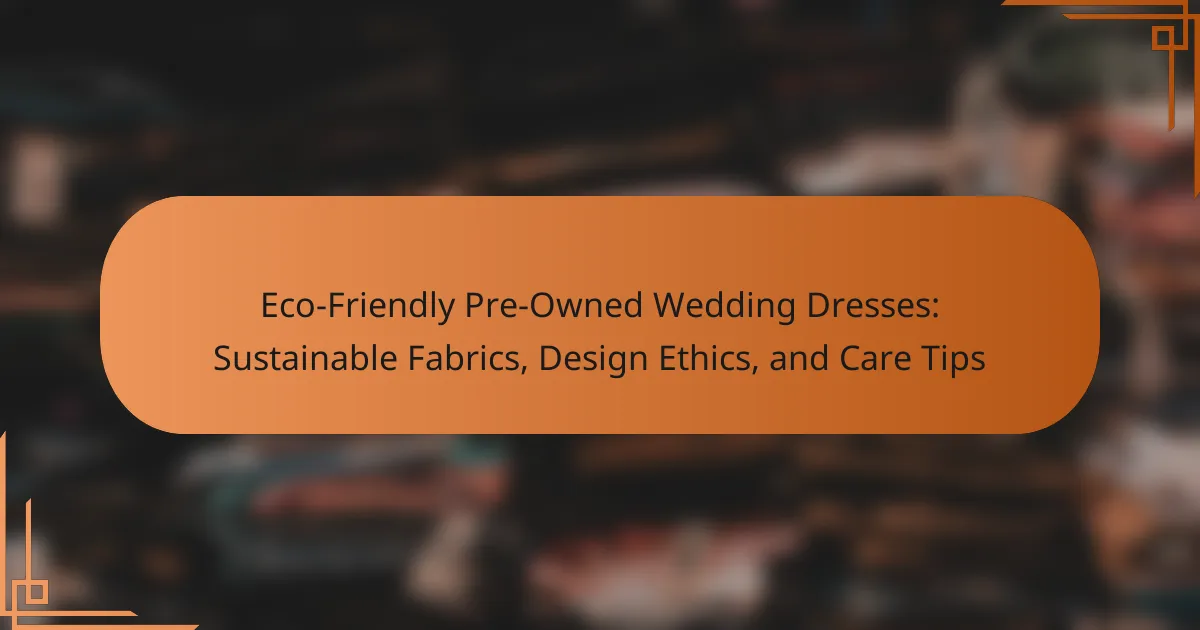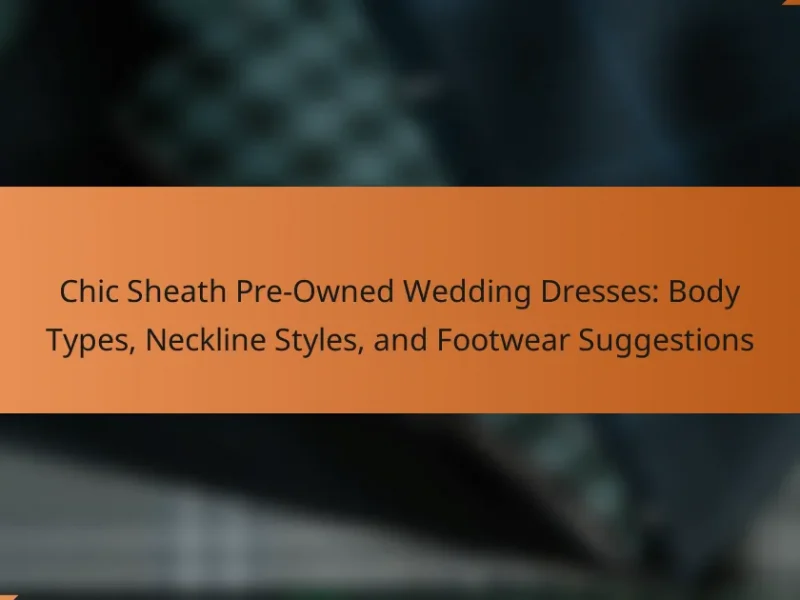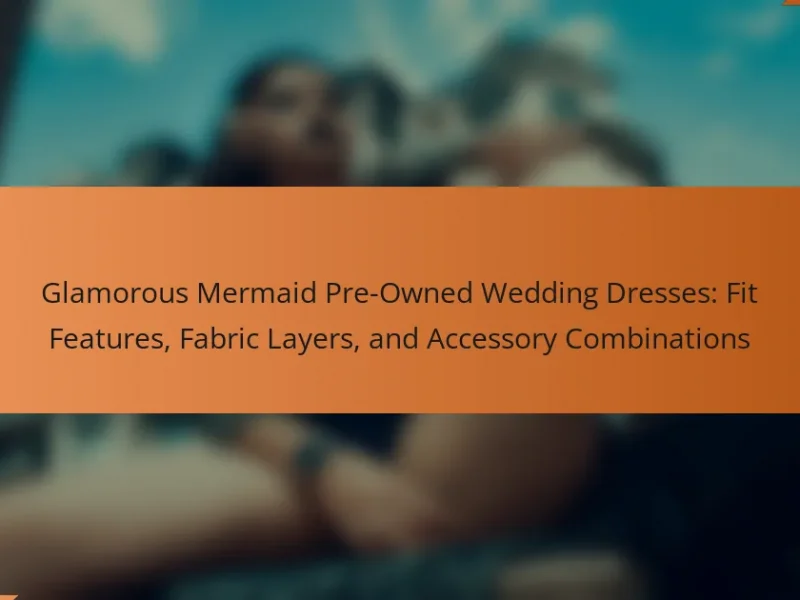Eco-friendly pre-owned wedding dresses are previously worn gowns that promote sustainability by reducing waste and extending the lifecycle of wedding attire. These dresses are often crafted from sustainable fabrics, which minimize their environmental impact and align with ethical consumerism trends. Choosing a pre-owned dress not only decreases the demand for new production but also provides cost-effective options for brides while adding uniqueness to their wedding. The article will explore the benefits of selecting eco-friendly pre-owned wedding dresses, including their sustainable materials, cost savings, and tips for finding the perfect gown through online marketplaces and local bridal shops.
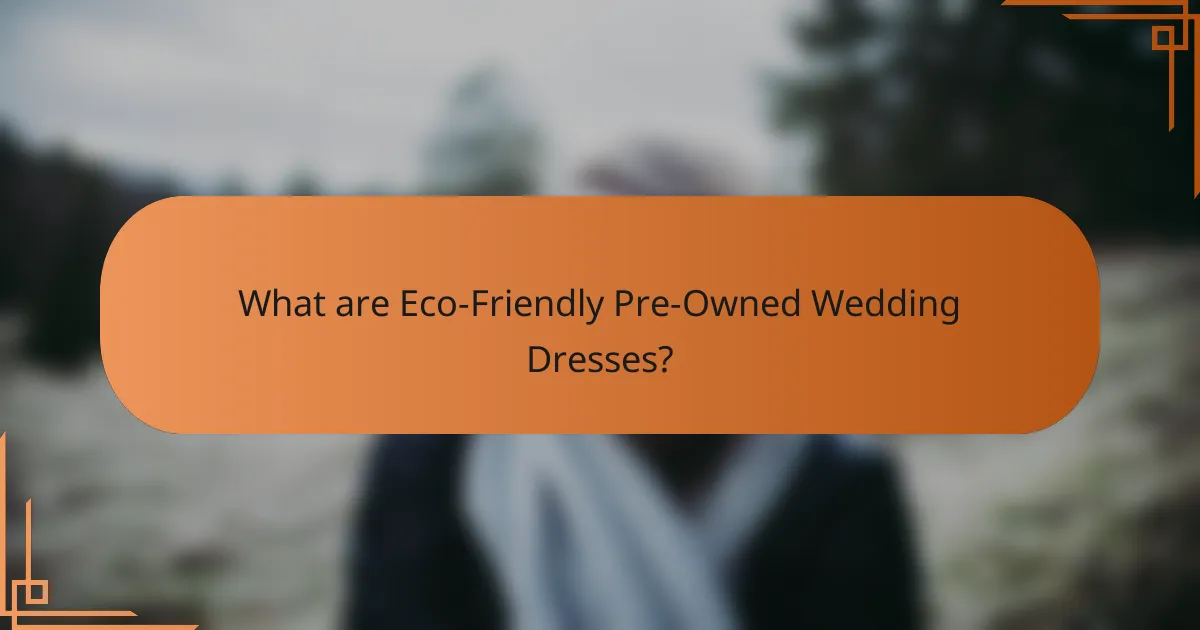
What are Eco-Friendly Pre-Owned Wedding Dresses?
Eco-friendly pre-owned wedding dresses are previously worn gowns that promote sustainability. These dresses reduce waste by extending the lifecycle of wedding attire. They are often made from sustainable fabrics, minimizing environmental impact. Choosing a pre-owned dress also decreases the demand for new production, which can be resource-intensive. Statistics show that the fashion industry contributes significantly to pollution, making eco-friendly choices crucial. By opting for these dresses, brides can make a positive environmental statement. This choice aligns with growing trends in sustainable fashion and ethical consumerism.
Why choose pre-owned wedding dresses for an eco-friendly option?
Choosing pre-owned wedding dresses is an eco-friendly option because it reduces waste and conserves resources. The fashion industry is one of the largest polluters globally. By opting for a pre-owned dress, consumers help minimize the demand for new production. This choice also extends the life cycle of garments, preventing them from ending up in landfills. According to the Environmental Protection Agency, textile waste accounts for 9.2 million tons annually in the U.S. Purchasing a dress that has already been made reduces the carbon footprint associated with manufacturing. Additionally, pre-owned dresses often come at a lower cost, making them economically viable. Thus, selecting pre-owned wedding dresses supports sustainability while also being budget-friendly.
What are the environmental impacts of traditional wedding dress production?
Traditional wedding dress production has significant environmental impacts. The process often involves the use of non-biodegradable synthetic fabrics. These materials can take hundreds of years to decompose in landfills. Additionally, the production of textiles typically requires substantial water consumption. For instance, producing one cotton wedding dress can consume over 2,700 liters of water.
Chemical dyes and treatments used in fabric production can pollute local water sources. This contamination affects aquatic ecosystems and can harm wildlife. Furthermore, the carbon footprint associated with manufacturing and transporting wedding dresses contributes to climate change.
Overall, traditional wedding dress production poses serious challenges to environmental sustainability.
How do pre-owned dresses contribute to sustainability?
Pre-owned dresses contribute to sustainability by reducing waste and minimizing resource consumption. Each pre-owned dress prevents new garments from being produced, which saves water and energy. For instance, producing a new dress can require up to 2,700 liters of water. Additionally, buying second-hand extends the lifecycle of clothing, decreasing the demand for fast fashion. Fast fashion is responsible for significant environmental pollution and textile waste. By choosing pre-owned options, consumers support a circular economy, which promotes recycling and reusing materials. This choice also helps to lower carbon emissions associated with manufacturing and shipping new clothing.
What sustainable fabrics are commonly used in eco-friendly wedding dresses?
Sustainable fabrics commonly used in eco-friendly wedding dresses include organic cotton, linen, hemp, and Tencel. Organic cotton is grown without synthetic pesticides or fertilizers, making it environmentally friendly. Linen is made from flax plants, which require less water and pesticides. Hemp is a durable fabric that grows quickly and naturally, enhancing sustainability. Tencel is produced from sustainably sourced wood pulp and is biodegradable. These fabrics minimize environmental impact while providing stylish options for wedding attire.
What are the benefits of using organic cotton in wedding dresses?
Organic cotton in wedding dresses offers numerous benefits. It is grown without synthetic pesticides and fertilizers. This makes it safer for the environment and reduces chemical exposure for wearers. Organic cotton is also softer and more breathable than conventional cotton. This enhances comfort, especially during long wedding ceremonies. Additionally, organic cotton production often uses less water, promoting sustainability. It supports farmers who practice eco-friendly agriculture, contributing to ethical fashion. Studies show that organic cotton farming improves soil health and biodiversity. These factors make organic cotton a responsible choice for wedding attire.
How does bamboo fabric compare to conventional materials?
Bamboo fabric is more sustainable than conventional materials like cotton and polyester. Bamboo requires less water and pesticides during cultivation. It grows rapidly, reaching maturity in three to five years. In contrast, cotton can take several months and uses significant water resources. Bamboo fabric is biodegradable, reducing environmental impact after disposal. Conventional materials, particularly synthetics, can take hundreds of years to decompose. Additionally, bamboo fabric has natural antibacterial properties, which can enhance hygiene. Conventional fabrics often require chemical treatments to achieve similar benefits. These factors make bamboo a more eco-friendly choice in textiles.
What design ethics should be considered for eco-friendly wedding dresses?
Design ethics for eco-friendly wedding dresses include sustainability, transparency, and social responsibility. Sustainability involves using materials that have minimal environmental impact. Organic cotton, hemp, and recycled fabrics are preferred options. Transparency requires brands to disclose sourcing and production methods. This builds trust with consumers. Social responsibility emphasizes fair labor practices in garment production. Ethical treatment of workers is crucial. Additionally, minimizing waste through design techniques, such as zero-waste patterns, is essential. These practices ensure that the wedding dress industry contributes positively to the environment and society.
How does ethical sourcing affect the wedding dress industry?
Ethical sourcing significantly impacts the wedding dress industry by promoting sustainable practices. It ensures that materials are sourced responsibly, reducing environmental harm. Ethical sourcing also supports fair labor practices, benefiting workers involved in garment production. According to the Ethical Fashion Report, brands that adopt ethical sourcing often see increased consumer trust and loyalty. This shift towards sustainability influences purchasing decisions, as modern consumers prefer eco-friendly options. Additionally, ethical sourcing can lead to innovation in fabric technology, creating sustainable alternatives. The wedding dress industry is gradually embracing these practices, aligning with broader trends in fashion.
Why is transparency in the supply chain important for consumers?
Transparency in the supply chain is important for consumers because it builds trust and accountability. Consumers want to know where their products come from and how they are made. This knowledge helps them make informed choices aligned with their values. For instance, transparency can reveal sustainable practices and ethical labor conditions. According to a 2020 study by the International Journal of Retail & Distribution Management, 73% of consumers are willing to pay more for products from transparent brands. This indicates that transparency can influence purchasing decisions significantly. Therefore, a transparent supply chain can enhance consumer loyalty and brand reputation.
How can I care for my eco-friendly pre-owned wedding dress?
To care for your eco-friendly pre-owned wedding dress, start by gently cleaning it with a mild detergent. Use cold water and avoid harsh chemicals that can damage sustainable fabrics. Hand washing is preferred to maintain the integrity of the material. If the dress is heavily soiled, consider professional cleaning by a specialist in eco-friendly practices. Store the dress in a breathable garment bag to prevent yellowing and damage from light. Keep it in a cool, dry place away from direct sunlight. Regularly check for any signs of wear or damage, and address them promptly to prolong the dress’s life. Following these steps can help maintain the dress’s beauty and sustainability.
What cleaning methods are safe for sustainable fabrics?
Safe cleaning methods for sustainable fabrics include gentle hand washing and using mild detergents. Hand washing minimizes wear and tear on the fabric. It is advisable to use cold water to prevent shrinkage and color fading. Machine washing should be avoided unless the care label specifically permits it. When machine washing, a delicate cycle with a mesh bag can be employed for added protection. Air drying is recommended over tumble drying to maintain fabric integrity. Avoiding bleach and harsh chemicals is crucial, as they can damage sustainable materials. These methods help preserve the quality and longevity of eco-friendly fabrics.
How should I store my wedding dress to maintain its quality?
Store your wedding dress in a cool, dry place to maintain its quality. Use a breathable garment bag made of cotton or muslin. Avoid plastic bags, as they can trap moisture and cause mildew. Lay the dress flat in a box lined with acid-free tissue paper. This prevents creasing and protects delicate fabrics. Check the dress periodically for any signs of damage or discoloration. Keep it away from direct sunlight to prevent fading. Proper storage can extend the life of the dress significantly.
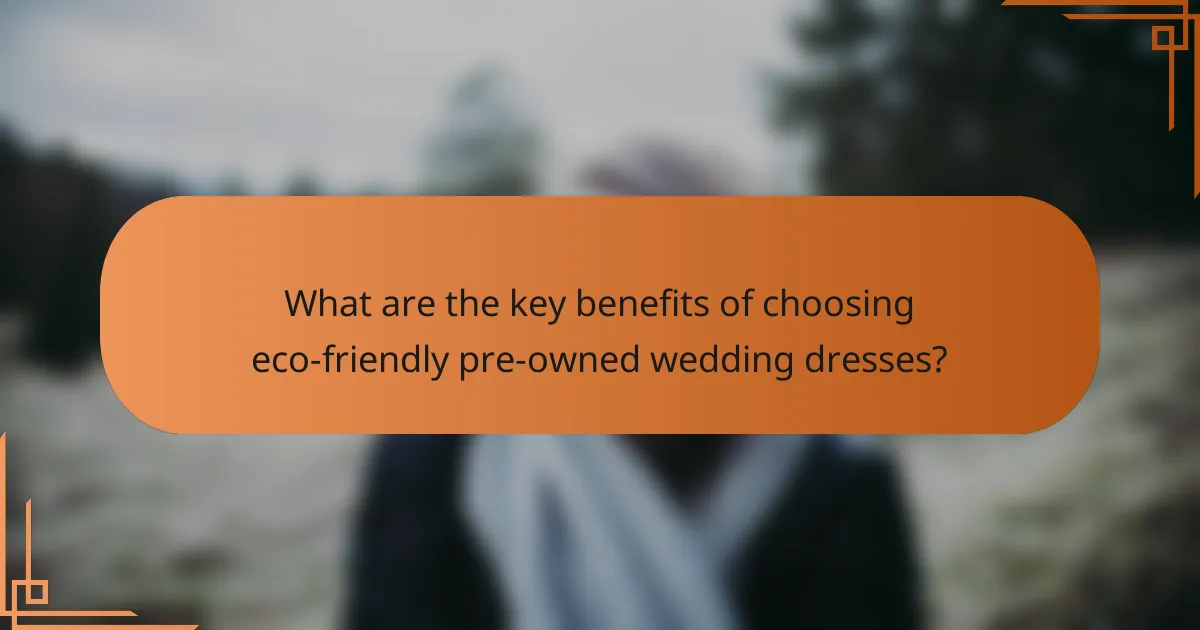
What are the key benefits of choosing eco-friendly pre-owned wedding dresses?
Choosing eco-friendly pre-owned wedding dresses offers several key benefits. First, it significantly reduces environmental impact. The production of new wedding dresses consumes resources and generates waste. By opting for pre-owned options, you help minimize textile waste in landfills.
Second, eco-friendly pre-owned dresses often feature sustainable materials. These fabrics are typically sourced with lower environmental footprints. Additionally, many pre-owned dresses come from brands committed to ethical practices. This ensures that the dress aligns with your values regarding sustainability.
Third, selecting a pre-owned dress can be cost-effective. Pre-owned options are usually priced lower than new ones. This allows for potential savings that can be allocated to other aspects of the wedding.
Finally, choosing a unique pre-owned dress can add character to your wedding. Each dress has its own history, making it a distinctive choice. This uniqueness can enhance the overall aesthetic of your special day.
How does selecting a pre-owned dress impact your budget?
Selecting a pre-owned dress significantly reduces your budget for wedding attire. Pre-owned dresses typically cost 30% to 70% less than new ones. This price difference allows for savings that can be allocated to other wedding expenses. Additionally, purchasing a pre-owned dress often means accessing designer brands at a fraction of the retail price. The average cost of a new wedding dress is around $1,800, while pre-owned options can range from $500 to $1,200. This affordability makes it easier for brides to stay within their overall wedding budget.
What savings can be expected compared to buying new?
Purchasing eco-friendly pre-owned wedding dresses can lead to significant savings compared to buying new. Typically, these dresses can cost 30% to 70% less than their new counterparts. The savings arise from the reduced production costs associated with pre-owned garments. Additionally, many pre-owned dresses are of high quality, often made from sustainable fabrics, which further enhances their value. By choosing a pre-owned dress, buyers also contribute to sustainability efforts, reducing waste in the fashion industry.
What unique styles can be found in pre-owned wedding dresses?
Unique styles in pre-owned wedding dresses include vintage, bohemian, and minimalist designs. Vintage styles often feature intricate lace, beading, and classic silhouettes from past decades. Bohemian dresses typically showcase flowing fabrics, earthy tones, and relaxed fits. Minimalist styles focus on clean lines, simple fabrics, and understated elegance. Other unique options can include non-traditional colors, asymmetrical hemlines, and statement sleeves. Each style reflects diverse aesthetic preferences and allows for personalization. The availability of these styles is influenced by past fashion trends and individual seller choices. Pre-owned wedding dresses provide a sustainable option while offering unique fashion statements.
How do vintage designs influence modern wedding dress choices?
Vintage designs significantly influence modern wedding dress choices by providing inspiration for styles, fabrics, and silhouettes. Many contemporary designers draw from the aesthetics of past decades, such as the 1920s flapper style or the 1950s ball gowns. These designs often feature intricate lace, beading, and unique cuts that appeal to modern brides seeking individuality.
The resurgence of vintage-inspired elements reflects a desire for authenticity and nostalgia in wedding attire. For instance, a study by the Fashion Institute of Technology found that 45% of brides consider vintage styles when selecting their wedding dress. This trend emphasizes sustainability, as pre-owned dresses promote eco-friendly practices by reducing waste.
Overall, vintage designs enrich modern wedding dress selections by blending traditional craftsmanship with contemporary fashion sensibilities.
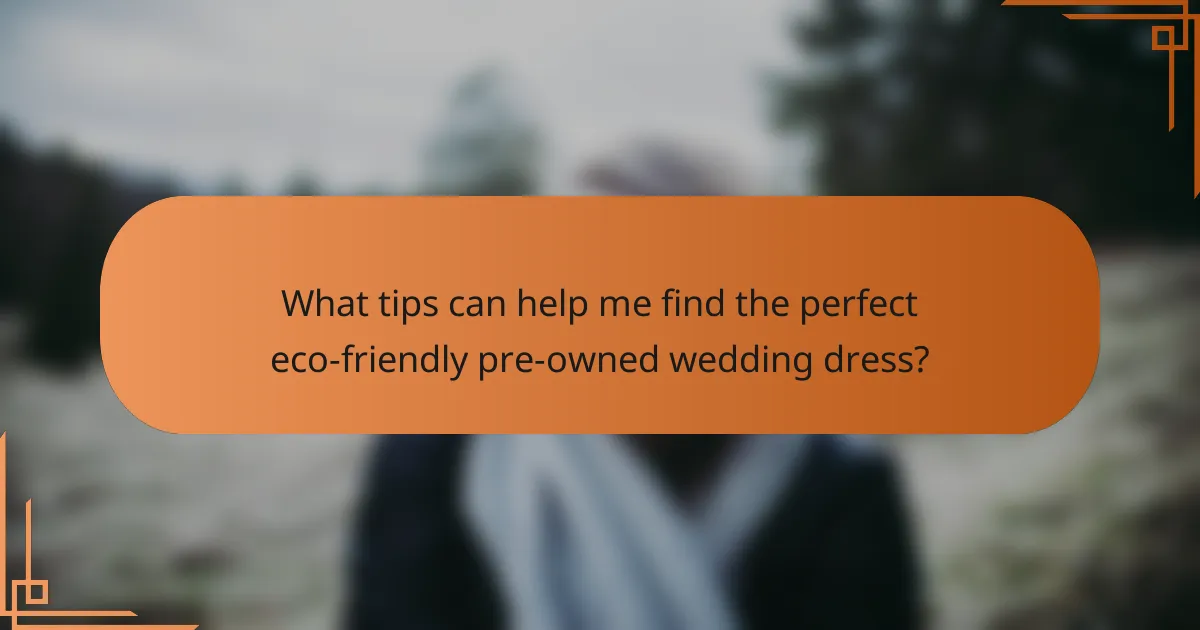
What tips can help me find the perfect eco-friendly pre-owned wedding dress?
To find the perfect eco-friendly pre-owned wedding dress, start by researching online marketplaces specializing in sustainable fashion. Websites like Stillwhite and PreOwnedWeddingDresses offer a variety of options. Check the dress’s material for eco-friendly fabrics like organic cotton or recycled polyester. Look for sellers who provide detailed descriptions and photographs to assess the dress’s condition. Consider visiting local bridal shops that carry pre-owned dresses to try them on. Verify the dress’s history, including previous ownership and any alterations made. Set a budget to narrow down your choices while ensuring the dress aligns with your sustainability values. Finally, read reviews from previous buyers to gauge the seller’s reliability and the quality of the dress.
How can I start my search for the ideal dress?
Begin your search for the ideal dress by defining your preferences. Consider the style, color, and fabric that appeal to you. Research eco-friendly options, focusing on pre-owned wedding dresses. Explore online platforms and local boutiques specializing in sustainable fashion. Set a budget to narrow down your choices effectively. Read reviews and testimonials to gauge the quality of dresses. Attend bridal fairs or events to see dresses in person. Lastly, consult with friends or family for additional insights and recommendations.
What online platforms specialize in pre-owned wedding dresses?
Online platforms that specialize in pre-owned wedding dresses include Stillwhite, PreOwnedWeddingDresses, and OnceWed. These platforms provide a marketplace for brides to buy and sell used wedding gowns. Stillwhite features thousands of listings from various designers. PreOwnedWeddingDresses offers a wide selection and allows sellers to list their dresses for free. OnceWed focuses on curated selections and also includes wedding accessories. Each platform supports sustainability by promoting the reuse of wedding dresses.
How can thrift stores be a resource for unique finds?
Thrift stores can be a resource for unique finds due to their diverse inventory of pre-owned items. These stores often carry one-of-a-kind pieces that are not available in mainstream retail outlets. Shoppers can discover vintage clothing, rare accessories, and distinctive home decor. Many thrift stores receive donations from various sources, contributing to a constantly changing selection. This variability means that each visit can yield different treasures. Additionally, thrift stores often feature items with unique designs and craftsmanship. These characteristics appeal to individuals seeking sustainable fashion options. The practice of shopping at thrift stores promotes eco-friendly consumption by reducing waste.
Eco-friendly pre-owned wedding dresses are previously worn gowns that promote sustainability by reducing waste and minimizing resource consumption. This article explores the benefits of choosing pre-owned dresses, including their lower environmental impact, cost-effectiveness, and unique styles. It examines sustainable fabrics commonly used in these dresses, such as organic cotton and bamboo, and discusses design ethics, transparency in sourcing, and care tips for maintaining dress quality. Additionally, it highlights online platforms and thrift stores as valuable resources for finding eco-friendly options.
